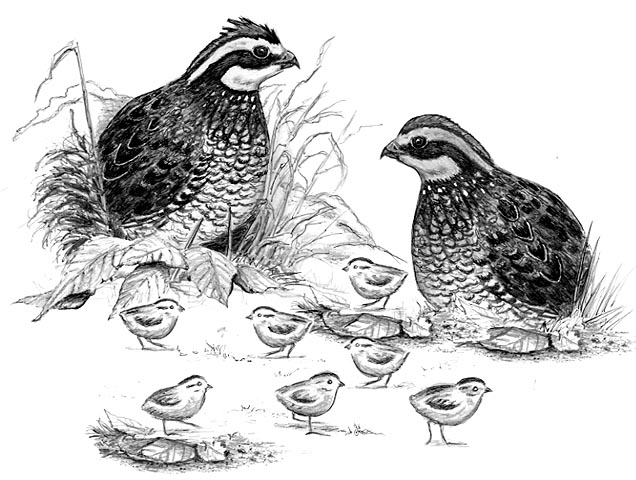
Dear Bird Folks,
Summer is almost over and it just hit me: I haven’t heard or seen a single bobwhite all season. Are they avoiding my yard or has something happened to them?
– Meryl, Dennis, MA
I remember Bobwhites, Meryl,
The first time I heard their signature “bobwhite” call I was a kid riding in the back seat of my parents’ Studebaker. And I swear on the grave of That Quail, Robert, the following story is true. My Dad was lost, looking for his friend’s house in Mashpee. (This was back when going to Mashpee was like traveling to the frontier.) As we drove down a dirt road I heard a bobwhite call. Even at that age I knew what it was and in my most excited little kid’s voice I yelled, “I hear a bobwhi…” But before I could finish my sentence I was shouted down. “Shut-up,” my dad said. “I heard someone whistle to us.” He hit the brakes, put the car in reverse and started backing up. He told me to watch for his friend, but I was too busy laughing in the backseat to help. When things had finally quieted down and I felt it was safe to speak again, I told my dad that what he heard was actually a bird. I still can picture the puzzled look on his face. (It was the same puzzled look my mother had the day he came home driving a Studebaker.) My dad was the smartest guy I ever met, but he didn’t know much about birds…or cars.
Not too may years ago the calls and antics of Northern Bobwhites were common on Cape Cod. Several times a week different men would wander into my shop (yes, it was always men) and tell me about the bobwhites calling in their yards. These men would then proceed to do their own bobwhite impression and then boast about how the birds would always “answer back.” I never had the heart to tell any of them that they were wasting their time. The classic “bobwhite” call is typically given by males, loser males that haven’t been able to find mates of their own. These lonely birds would spend part of each day calling from a high perch, declaring to the world that they are available. The birds not only weren’t answering the men’s calls, but they didn’t care if they (the men) whistled, sang or played a guitar solo. Sorry, guys.
Sadly, those days appear to be over. In the past few decades the state’s quail population has dropped faster than the NFL Commissioner’s credibility. What happened? As usual, I blamed free-roaming housecats and as usual, everyone else blamed coyotes. But it is unlikely that either of these creatures are key factors. In fact, some researchers think the coyotes may actually benefit bobwhites by keeping more serious predators (including free-roaming housecats) in check. The real culprit here is our changing landscape. Bobwhites favor fields, cultivated land and open woodlands. Early farming practices produced the perfect quail nesting habitat and as a result their population exploded. Old photos of the Cape reveal that this area once had more farms and fields, and far fewer trees. Today Cape Cod is lush, green and mostly forested (or developed). That’s great news for songbirds, squirrels and people like me, who don’t dare go outside unless there’s shade, but it’s not very quail friendly.
The drop in the bobwhite population isn’t just confined to Cape Cod, either. It’s actually a problem throughout their entire range. And it’s not just softies like you and I who miss them. Bobwhites are also important game birds, so hunters have joined bird watchers (can you imagine?) in their concern for these little birds. What can be done, you ask? That’s a tough one. It’s not like banning DDT, or erecting a few Osprey platforms or keeping ORVs from squashing nesting shorebirds. Restoring vast tracks of habitat isn’t an easy thing to do. A few years ago the National Park Service, as part of its habitat restoration project, clear-cut an area around the Marconi site in Wellfleet. A lot of people were upset when they saw the trees coming down, but one of the workers told me that after the clearing work was done, the bobwhites returned. That’s great news, but trimming a few acres probably isn’t going to do much to reinstate our disappearing quail population. Sigh.
One thing the government likes to do in situations such as this is to release farm-raised quail to augment the wild population. This approach keeps the hunters happy, but it won’t do much to bring back the native birds. Farm-raised birds are dopey and don’t possess the instincts and skills needed to survive in the wild. It’s like dropping a covey of Wall Street CEOs into the wilderness and expecting them to reproduce. It would be funny, but it wouldn’t be successful.
Restocking programs aren’t going to do much to bring the bobwhites back, Meryl. It all comes down to having a place for them to live and right now that place doesn’t appear to be Cape Cod. Oh sure, there are a few pockets of quail here and there, and we are still going to hear them on occasion, but the overall outlook isn’t good. The greening of Cape Cod has increased the population of a number of birds, but unfortunately Northern Bobwhites aren’t on this list. I hate to say it, but the day may come when we no longer hear bobwhites around here and I’m going to miss them. Just like I miss riding in the Studebaker with my dad.